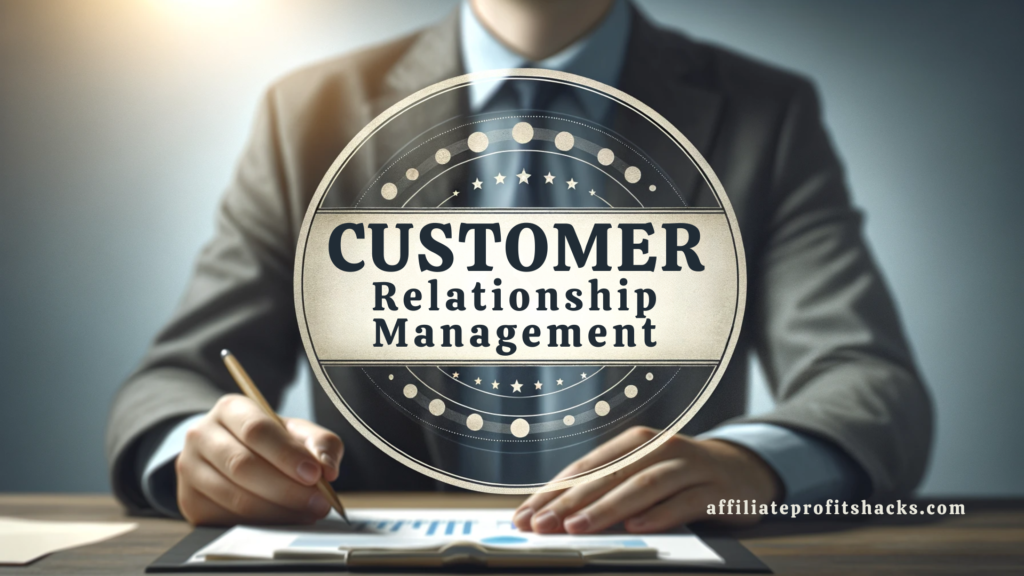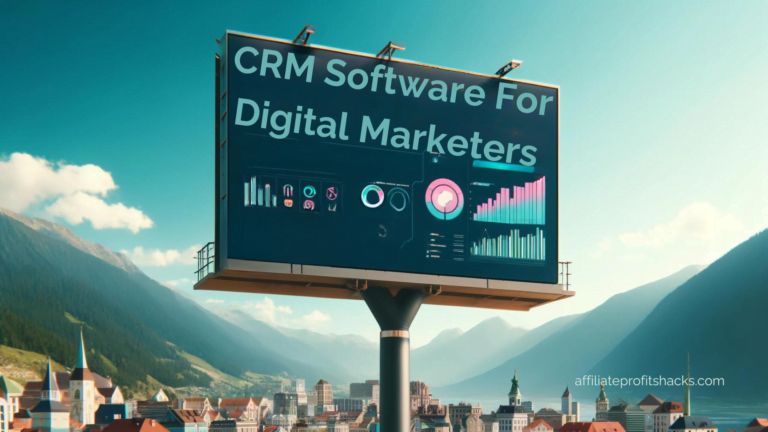Customer Relationship Management Software: CRM for Business
Welcome and thank you for checking out my article about Customer Relationship Management Software.
In today’s fast-paced business world, staying connected with customers and managing relationships effectively is crucial. This is where Customer Relationship Management (CRM) software steps in. It’s not just a tool but a game-changer for businesses of all sizes. CRM software helps companies track interactions, manage customer data, and streamline processes, ultimately leading to stronger customer relationships and business growth. The idea is simple yet powerful: know your customers well, and you’ll be able to serve them better.
Best Recommended and Proven Way to Make Money Online – Click HERE for Instant ACCESS >>

Key Features of CRM Software
Understanding the features of CRM software is crucial to grasp its potential. Here, we’ll explore the core functionalities that make CRM software an indispensable tool for businesses.
User-Friendly Interface
Firstly, an intuitive user interface is essential. It ensures that employees can navigate the software easily, leading to better adoption and more effective use.
Contact Management
Next, contact management stands at the heart of any CRM system. It allows businesses to organize and track all customer interactions and data, providing a 360-degree view of the customer.
Sales and Marketing Integration
Moreover, integrating sales and marketing functions streamlines the customer journey from prospect to loyal customer. This integration helps in tracking leads, managing sales pipelines, and creating targeted marketing campaigns.
Analytics and Reporting
Furthermore, analytics play a pivotal role. CRM software with robust analytics can provide insightful data, helping businesses make informed decisions and strategize effectively.
Mobile Accessibility
Finally, in our mobile-centric world, mobile accessibility of CRM software is non-negotiable. It enables sales and marketing teams to access data anytime, anywhere, enhancing responsiveness and efficiency.
Now, having explored the key features, let’s move on to understand how these features translate into tangible benefits for businesses.
Benefits of Implementing CRM Software in Businesses
Implementing CRM software can bring a multitude of benefits, significantly impacting various aspects of a business.
Enhanced Customer Understanding
One of the primary advantages is enhanced customer understanding. By consolidating customer information, CRM software provides in-depth insights into customer preferences and behaviors, enabling personalized service.
Streamlined Internal Processes
Additionally, CRM software streamlines internal processes. It automates tasks like data entry and scheduling, freeing up time for teams to focus on more strategic activities.
Improved Sales Performance
Importantly, CRM tools boost sales performance. They help in efficiently managing the sales pipeline, ensuring that no opportunity is missed and that efforts are focused on the most promising leads.
Better Customer Service
CRM software contributes to improved customer service. Quick access to customer information allows businesses to respond swiftly and accurately to customer inquiries and issues.
Data-Driven Decision-Making
Lastly, the robust reporting and analytics features of CRM software enable data-driven decision-making. Businesses can track key metrics, identify trends, and make strategic decisions based on real-time data.
As we see these benefits unfold, it becomes clear how CRM software can be a catalyst for business growth. Next, we’ll guide you through selecting the right CRM software for your business.
Choosing the Right CRM Software for Your Business
Selecting the right CRM software requires careful consideration of various factors to ensure it aligns with your business needs.
Assessing Business Requirements
Start by assessing your business requirements. Understand what problems you require the CRM to solve and what goals you aim to achieve with it.
Considering Scalability
It’s also vital to consider scalability. Choose a CRM that can grow with your business, accommodating increasing data and more complex processes over time.
Evaluating Integration Capabilities
Evaluate the integration capabilities of the CRM. It should seamlessly integrate with your existing systems and software, such as email, accounting, or customer service tools.
Prioritizing Ease of Use
Prioritize ease of use. A CRM that is easy to use and understand will have higher adoption rates among your team, ensuring you get the most out of the investment.
Best Recommended and Proven Way to Make Money Online – Click HERE for Instant ACCESS >>
Checking Vendor Support and Training
Lastly, don’t overlook vendor support and training. Reliable customer support and comprehensive training resources are essential for smooth implementation and usage.
By carefully considering these factors, you can select a CRM software that fits your current needs and supports your future growth.
CRM for Facebook
There are CRM’s available for Facebook and Facebook Messenger. One practical CRM is MyGeniusLeads. Software such as this allows the user to keep track of various prospects in the sales pipeline, regardless of what stage they are at. It also allows for sending broadcast messages to groups of people that fall under a particular “label”.
Embracing CRM Software for Future Success
Staying Ahead in a Competitive Market
In the competitive business world, staying ahead means understanding and anticipating customer needs. CRM software is the key to unlocking this understanding. By leveraging the power of CRM, businesses can gain a competitive edge, tailoring their services and products to meet the ever-evolving demands of their customers.
Transforming Data into Strategy
The wealth of data provided by CRM systems is a treasure trove for strategic decision-making. Businesses can transform raw data into actionable strategies, targeting specific market segments, refining marketing campaigns, and improving products based on customer feedback and behavior patterns.
Fostering a Customer-First Culture
Adopting CRM software goes beyond technology; it’s about cultivating a customer-first culture within the organization. This cultural shift ensures that every department, from sales to customer service, operates with a unified goal: to enhance customer satisfaction and loyalty.
Leveraging CRM for Long-Term Relationships
The ultimate goal of CRM software is to build and maintain long-term relationships with customers. It’s not just about making a sale; it’s about creating a journey where customers feel valued and understood. This long-term relationship fosters loyalty, which is invaluable in today’s market where customers have endless choices.
The Investment in Customer Success
Investing in CRM software is, fundamentally, an investment in customer success. When customers succeed and find value in your products or services, your business succeeds. CRM software provides the insights and tools needed to make this a reality, aligning business operations with customer success.
A Step Towards Digital Transformation
Lastly, implementing CRM software is a significant step towards digital transformation. In an era where digital is synonymous with efficiency, CRM software represents a strategic move towards modernizing business operations, setting the stage for future innovations and advancements.
Embracing Change for Growth
To conclude, the adoption of CRM software is more than a technological upgrade; it’s a commitment to growth, innovation, and customer-centricity. Businesses willing to embrace this change and invest in CRM software are positioning themselves for sustained success and a future where customer relationships are the cornerstone of business growth.
The Role of CRM in Business Innovation
CRM software isn’t just a tool for managing customer relationships; it’s a catalyst for business innovation. By providing detailed insights into customer behavior, CRM systems enable businesses to innovate in product development, marketing strategies, and customer service approaches. This innovation is crucial in keeping businesses relevant and competitive.
Enhancing Employee Engagement and Productivity
Another dimension of CRM software is its impact on employee engagement and productivity. With efficient tools at their disposal, employees can focus more on creative and strategic tasks rather than getting bogged down by administrative work. This improves productivity and enhances job satisfaction, leading to a more motivated workforce.
Building a Sustainable Business Model
Incorporating CRM software into business operations contributes to building a sustainable business model. By fostering strong customer relationships and efficient internal processes, businesses can ensure long-term sustainability. This sustainability is key in an ever-changing business landscape, where short-term gains are often overshadowed by the need for long-term planning and stability.
CRM as a Gateway to Global Markets
For businesses looking to expand globally, CRM software can be a gateway. Understanding local customer preferences, managing international contacts, and adapting to different market dynamics becomes manageable with a robust CRM system. This global reach is essential for businesses aiming to establish a presence in diverse markets.
Personalization at Scale
One of the most significant advantages of CRM software is the ability to personalize at scale. Businesses can offer personalized experiences to numerous customers, something that was not feasible in the past. This level of personalization strengthens customer relationships and sets businesses apart from competitors.
Preparing for the Future of AI and CRM
Looking towards the future, the integration of artificial intelligence (AI) with CRM software is set to redefine customer relationship management. AI can offer predictive insights, automate routine tasks, and provide a more nuanced understanding of customer needs. Preparing for this integration is essential for businesses wanting to stay at the forefront of technological advancements.
The Ethical Considerations of CRM
Finally, as businesses embrace CRM software, it’s crucial to consider the ethical implications, particularly regarding customer data privacy and security. Responsible handling of customer data builds trust and aligns with global standards and regulations.
CRM’s Role in Customer Lifecycle Management
The utility of CRM software extends beyond mere customer data management; it plays a pivotal role in managing the entire customer lifecycle. From the initial point of contact to post-sale service and repeat purchases, CRM systems help businesses map and enhance every stage of the customer journey. This comprehensive approach ensures a consistent and positive customer experience, which is vital for building long-term loyalty.
Best Recommended and Proven Way to Make Money Online – Click HERE for Instant ACCESS >>
Collaborative Synergy Across Departments
Another significant aspect of CRM software is its ability to foster collaborative synergy across different departments. Sales, marketing, customer service, and even product development teams can work in unison, sharing valuable customer insights and aligning their strategies. This collaboration breaks down silos within an organization and leads to a more cohesive and efficient operation.
The Role of CRM in Risk Management
CRM software also plays a crucial role in risk management. By providing real-time data and analytics, businesses can identify potential issues in customer satisfaction or market trends, allowing them to take proactive measures. This foresight can be critical in mitigating risks and ensuring business stability.
Enhancing Brand Reputation Through CRM
In today’s digital era, brand reputation is heavily influenced by customer experiences and feedback. CRM software enables businesses to monitor and manage these aspects effectively. By promptly addressing customer concerns and maintaining a positive engagement, businesses can enhance their brand reputation and foster trust in the market.
The Environmental Impact of CRM
Moving to digital CRM systems also has an environmental aspect, as it reduces the need for paper-based processes and physical storage. This shift enhances operational efficiency and contributes to a business’s environmental sustainability efforts, an increasingly important consideration for modern consumers and stakeholders.
Preparing for Data-Driven Future with CRM
As we advance towards an even more data-driven future, the role of CRM in harnessing and interpreting vast amounts of customer data becomes even more crucial. Businesses equipped with sophisticated CRM systems will be better prepared to adapt to emerging trends, make informed strategic decisions, and maintain a competitive edge in their industries.
Building a Resilient Business Model
Finally, adopting CRM software is a step towards building a resilient business model. In an era marked by rapid changes and uncertainties, having a system that provides comprehensive insights into customer preferences, market trends, and internal processes is invaluable. It allows businesses to quickly adapt, pivot strategies if required, and maintain continuity in operations.
CRM as a Driver of Customer Centricity
At its core, CRM software is a driver of customer centricity. It allows businesses to shift from product-centric to customer-centric models, where decisions are made based on customer needs and preferences. This shift is essential in today’s market, where customer experience often dictates the success or failure of a business. By centralizing customer information and making it accessible across departments, CRM systems enable businesses to deliver personalized experiences consistently.
The Integration of CRM with Emerging Technologies
The integration of CRM software with other emerging technologies like the Internet of Things (IoT), big data, and machine learning is setting the stage for even more advanced customer relationship management. For instance, IoT devices can feed real-time customer usage data into CRM systems, enabling businesses to anticipate needs or troubleshoot issues proactively. Big data analytics, on the other hand, can process vast amounts of customer data to reveal patterns and trends that inform strategic decisions.
CRM’s Role in Enhancing Employee-Customer Interaction
CRM software also enhances the quality of employee-customer interactions. With access to comprehensive customer histories and preferences, employees can engage in more meaningful, informed conversations with customers. This level of personalized interaction can significantly improve customer satisfaction and loyalty, as customers feel understood and valued.
Streamlining Operations and Reducing Costs
Another crucial aspect of Customer Relationship Management software is its ability to streamline operations and reduce costs. Automating routine tasks, reducing data entry errors, and improving process efficiency saves time and reduces operational expenses. These savings can then be redirected into other areas of the business, such as product development or marketing.
CRM’s Role in Compliance and Security
In an age where data privacy and security are paramount, CRM software plays a vital role in ensuring compliance with various data protection regulations. Good CRM systems come equipped with features that help businesses manage customer data responsibly, securely, and in compliance with laws like GDPR or CCPA. This compliance protects the business from legal issues and builds customer trust.
Preparing for an Agile Business Environment
Adopting CRM software prepares businesses for an agile business environment. With the ability to quickly access and analyze customer data, businesses can respond swiftly to market changes, customer feedback, and competitive pressures. This agility is crucial for maintaining relevance and competitiveness in a rapidly evolving business landscape.
The Long-Term Vision: Building a Future-Proof Business
Finally, investing in CRM software is about building a future-proof business. In a world where technology and customer expectations are constantly evolving, having a robust CRM system provides the foundation for continuous adaptation and growth. It’s not just a tool for today; it’s an investment in the long-term success and sustainability of the business.
Conclusion:
In conclusion, the journey through the world of Customer Relationship Management software reveals its critical role in the modern business landscape. Embracing CRM software is not just about adopting new technology; it’s about evolving with the changing dynamics of customer relations and market demands.
The Future of Business-Customer Interaction
CRM software stands at the forefront of this evolution. It’s reshaping how businesses interact with customers, turning every interaction into an opportunity for growth and learning. The advanced features of CRM systems, from detailed analytics to mobile accessibility, are setting new standards for customer engagement.
A Continuous Learning Curve
It’s important to remember that the implementation of CRM software is a continuous learning curve. Businesses must remain adaptable, always ready to evolve their strategies in line with new insights and changing customer needs.
Making a Wise Investment
For businesses on the fence about investing in CRM software, consider this: the value of deeply understanding your customers and efficiently managing relationships cannot be overstated. In the digital age, where personalization and quick response times are key, CRM software is no longer a luxury—it’s a necessity.
Preparing for a Customer-Centric Future
As we look to the future, one thing is clear: the businesses that will thrive are those that put customers at the center of their strategy. CRM software is the tool that can make this customer-centric vision a reality, providing insights and efficiencies that can propel a business to new heights.
Best Recommended and Proven Way to Make Money Online – Click HERE for Instant ACCESS >>
The Call to Action
So, the call to action for businesses of all sizes is clear: explore, adapt, and invest in CRM software. It’s an investment in your customers, and by extension, an investment in the future of your business. The journey towards enhanced customer relationship management starts here, and the rewards are limitless.
Thank you for taking the time to read my article “Customer Relationship Management Software: A Strategic Tool for Business Growth”. I hope that you found value in it!
You might find this related article about Facebook Marketing Tools interesting.







